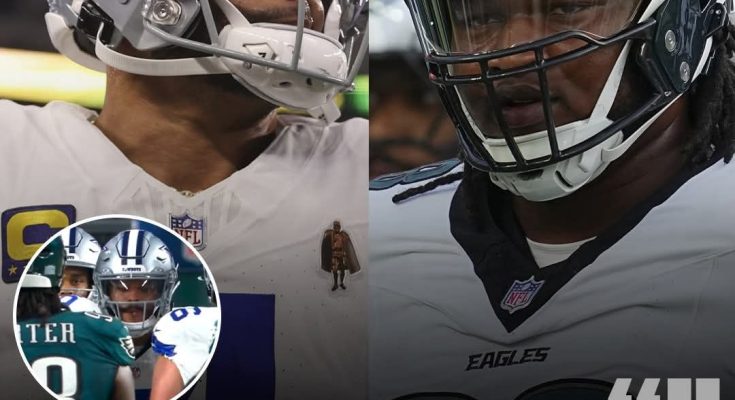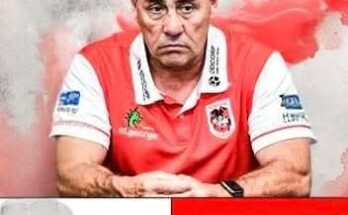In the high-stakes world of the NFL, emotions run fiercely on the field. Rivalries are intense, competition fierce, and sometimes tempers flare in moments that capture the attention of fans and media alike. One such moment recently occurred involving the Philadelphia Eagles’ defensive tackle Jalen Carter and the Dallas Cowboys’ quarterback Dak Prescott. What initially appeared as a heated exchange escalated into an incident that has since been labeled as “spit-gate” due to Carter allegedly spitting on Prescott during a game. However, in a rare and commendable show of accountability, Carter stepped forward to take responsibility for his actions, offering an apology and clarifying the context in which the event took place.
The incident unfolded during a tightly contested game between the Eagles and the Cowboys, two teams with a storied rivalry. Both players, Carter and Prescott, are central figures for their teams: Prescott, a veteran quarterback known for his leadership and resilience, and Carter, a young defensive talent whose aggressive playstyle has rapidly made him a standout in the league. The encounter between the two was the kind of moment that can change the momentum of a game, but instead, it became a flashpoint for controversy and discussion across the NFL.
During a pivotal play, Carter and Prescott found themselves in close quarters after a physical confrontation. According to eyewitness accounts and video footage, there appeared to be an exchange of words and an aggressive gesture by Carter, who was seen to have spit in the direction of Prescott. While the act itself may seem minor to some, spitting is widely regarded in sports as a sign of disrespect and unsportsmanlike conduct, crossing a line of professional decorum. The NFL is particularly strict about such behavior, and the incident quickly sparked debate about sportsmanship and player conduct in the league.
In the immediate aftermath, reactions varied. Prescott, maintaining his composure, addressed the incident with measured remarks, emphasizing the importance of respect on the field. Meanwhile, fans of both teams took to social media to voice their opinions, some defending Carter as a passionate competitor caught up in the heat of the moment, others condemning the act as unnecessary and disrespectful. The Cowboys’ organization did not escalate the issue publicly, choosing instead to focus on the next game. The Eagles, too, initially remained silent, possibly awaiting further clarity before making an official statement.
What truly set this episode apart, however, was Carter’s decision to openly acknowledge his role in the incident. In a post-game interview, Carter expressed regret for his actions, stating that the moment got the better of him and that his behavior did not reflect the values he wants to represent both personally and as a member of the Eagles. His willingness to take responsibility rather than deflect or deny was widely praised by analysts and fans alike.
Carter explained that the incident was not premeditated but a lapse in judgment fueled by the adrenaline and intensity that come with competing at the highest level. “I let my emotions get the best of me,” Carter admitted. “That’s on me, and I apologize to Dak, to the Cowboys, and to the fans. That’s not how I want to play the game or how I want to represent my team.” His tone was sincere and reflective, signaling a maturity beyond his years in dealing with the repercussions of his actions.
This kind of accountability is important in professional sports, where players often become role models for younger generations and where their behavior both on and off the field is scrutinized. The NFL has had its share of controversies over the years, and incidents like these highlight the ongoing challenge of balancing passion and professionalism. Carter’s statement served as a reminder that athletes are human, prone to mistakes, but also capable of growth and learning.
Beyond the immediate apology, Carter took steps to make amends by reaching out directly to Prescott. Reports indicate that he contacted Prescott privately to express his remorse and to ensure that any personal tensions between them were resolved. Prescott reportedly appreciated the gesture, emphasizing that while competitive emotions are part of the game, respect must always remain paramount. The two players’ ability to move past the incident reflects a broader ethos in sportsmanship that prioritizes respect and understanding even amidst fierce rivalry.
From a team perspective, the Eagles organization also responded constructively. While they did not issue a formal disciplinary action publicly, they emphasized the importance of professionalism and conduct in team culture. Coaches and team leaders reportedly met with Carter to discuss the incident, reinforcing the message that while competitive fire is essential, it must be tempered with respect for opponents and the integrity of the game.
The media coverage of the incident was extensive, highlighting not only the act itself but also Carter’s response. Analysts debated the role of emotions in football, with some defending Carter’s passion and others cautioning about the potential negative impact of such behavior. Many commentators praised Carter for his mature handling of the situation afterward, suggesting that his accountability could serve as a positive example for other players who might find themselves in similar situations.
Looking at the broader context, the incident and Carter’s response underscore the evolving nature of sportsmanship in the NFL. As the league continues to grow in popularity and visibility, there is increasing pressure on players to maintain high standards of conduct. The presence of cameras on every play and the rise of social media mean that moments like these are scrutinized not just by fans but by a global audience. This environment can amplify mistakes but also create opportunities for players to demonstrate character and growth, as Carter did.
The spitting incident, while unfortunate, may ultimately become a defining moment for Carter’s career—not as a stain, but as a turning point. His willingness to own up to his mistake and seek reconciliation can serve as a powerful narrative of personal responsibility and professionalism. It also sends a message to teammates and young athletes that integrity matters, even when emotions run high.
As the season progresses, both Carter and Prescott will likely face each other again on the field. The memory of the incident may linger among fans, but for the players themselves, it seems to have been a moment that brought a deeper respect for one another. Competitive rivalries are part of what make the NFL exciting, but moments of accountability and sportsmanship remind everyone involved why the game matters beyond just wins and losses.
In the aftermath of “spit-gate,” it’s clear that Carter’s approach to handling the incident sets a positive precedent. Instead of letting the moment define him negatively, he chose to demonstrate humility and respect, qualities that resonate well beyond the football field. His actions remind us all that mistakes happen, but how we respond to them truly shapes our character.
Ultimately, the Jalen Carter and Dak Prescott incident is more than just a footnote in a football season. It reflects the complexities of competitive sports—the pressure, the passion, and the human element behind the helmet. It also highlights the power of accountability and the importance of maintaining respect amidst rivalry. For fans and players alike, these are valuable lessons that extend far beyond the gridiron.
As the Eagles and Cowboys continue their fierce competition, the story of Carter’s apology and ownership of the incident stands as a testament to the evolving standards of sportsmanship in the NFL. It is a reminder that even in the heat of battle, respect and responsibility remain fundamental pillars of the game. And in that way, what began as a controversial moment may ultimately contribute to a stronger, more respectful culture within the league.



